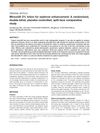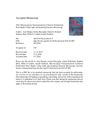 41 citations,
November 2020 in “Colloids and surfaces. B, Biointerfaces”
41 citations,
November 2020 in “Colloids and surfaces. B, Biointerfaces” Different hair protein amounts change the strength of keratin/chitosan gels, useful for making predictable tissue engineering materials.
 67 citations,
November 2019 in “Molecules”
67 citations,
November 2019 in “Molecules” Tea, especially green tea, shows promise in cosmetics for skin and hair benefits but more research is needed for effective use.
[object Object]  271 citations,
March 1999 in “Developmental biology”
271 citations,
March 1999 in “Developmental biology” The research shows that a gene called Wnt3 affects hair growth and structure, causing short hair and balding when overactive.
 56 citations,
January 2019 in “Lancet”
56 citations,
January 2019 in “Lancet” JAK inhibitors help regrow hair in alopecia areata patients, improving their quality of life.
 January 2023 in “Skin appendage disorders”
January 2023 in “Skin appendage disorders” Laser treatment for hair loss works equally well on different skin types, but more research is needed for very dark skin.
 July 2018 in “Elsevier eBooks”
July 2018 in “Elsevier eBooks” Telogen Effluvium is a common, usually reversible hair loss condition, often improved by removing the trigger and possibly treated with various products, though their effectiveness is uncertain.
 July 2019 in “Journal of Investigative Dermatology”
July 2019 in “Journal of Investigative Dermatology” The research found that male pattern hair loss is mostly genetic and involves hair thinning due to hormonal effects and changes in gene expression.
 18 citations,
January 1999 in “CNS Drugs”
18 citations,
January 1999 in “CNS Drugs” Some anticonvulsant drugs can cause skin reactions, ranging from mild to severe, and managing these reactions is important for patient care.
 19 citations,
July 2018 in “ACS biomaterials science & engineering”
19 citations,
July 2018 in “ACS biomaterials science & engineering” Bleaching and combing damage hair's surface and mechanical properties.
 January 2023 in “Bio web of conferences/BIO web of conferences”
January 2023 in “Bio web of conferences/BIO web of conferences” The document concludes that specific dermoscopic features can help diagnose different facial red skin conditions.
 93 citations,
February 2015 in “Journal of Investigative Dermatology”
93 citations,
February 2015 in “Journal of Investigative Dermatology” Oxidative stress affects hair loss in men with androgenetic alopecia.
 13 citations,
November 2013 in “The Journal of Dermatology”
13 citations,
November 2013 in “The Journal of Dermatology” Minoxidil 2% lotion is safe and effective for making eyebrows thicker and fuller.
 15 citations,
November 2002 in “Cardiology in Review”
15 citations,
November 2002 in “Cardiology in Review” Cardiovascular drugs can cause various skin problems, so recognizing these reactions is important.
[object Object]  2 citations,
January 2022 in “Skin appendage disorders”
2 citations,
January 2022 in “Skin appendage disorders” A combination of methotrexate injections and CO2 laser treatment led to complete hair regrowth in two patients with hard-to-treat alopecia.
 2 citations,
January 2018 in “Recent clinical techniques, results, and research in wounds”
2 citations,
January 2018 in “Recent clinical techniques, results, and research in wounds” Low-Level Laser Therapy helps heal wounds and regenerate tissue when used correctly.
 April 2019 in “Journal of the Dermatology Nurses’ Association”
April 2019 in “Journal of the Dermatology Nurses’ Association” A 37-year-old man with hair loss and skin issues was successfully treated with oral antibiotics, highlighting the need for early treatment. Long-term care includes low-dose antibiotics and avoiding caps and wigs.
 3 citations,
May 2018 in “Experimental Dermatology”
3 citations,
May 2018 in “Experimental Dermatology” Young HS patients often have other physical and mental health issues, and research on HS covers a wide range of topics including genetics, triggers, treatments, and the need for more data.
 11 citations,
September 1999 in “Journal of the European Academy of Dermatology and Venereology”
11 citations,
September 1999 in “Journal of the European Academy of Dermatology and Venereology” Immunomodulatory therapies are effective for treating cutaneous lymphoma, particularly in early stages.
 67 citations,
October 1997 in “Dermatologic Surgery”
67 citations,
October 1997 in “Dermatologic Surgery” The EpiLight Hair Removal System removed about 60% of hair with some side effects, and more research is needed to confirm long-term effectiveness.
63 citations,
February 2017 in “ACS biomaterials science & engineering” Polydopamine is a safe, effective, and permanent hair dye that turns gray hair black in one hour.
 6 citations,
December 2017 in “Journal of Cosmetic and Laser Therapy”
6 citations,
December 2017 in “Journal of Cosmetic and Laser Therapy” Low-level laser therapy can improve hair density in people with androgenic alopecia, but more research is needed to find out who it works best for.
 6 citations,
January 2016 in “Annals of Dermatology”
6 citations,
January 2016 in “Annals of Dermatology” Human hair contains more glycosaminoglycans in children than adults, and these compounds decrease with age, possibly affecting hair thickness.
 12 citations,
July 2016 in “Forensic science international”
12 citations,
July 2016 in “Forensic science international” The research found that postmortem root bands in hair are likely caused by the breakdown of a specific part of the hair's inner structure after death.
 August 2018 in “Journal of the American Academy of Dermatology”
August 2018 in “Journal of the American Academy of Dermatology” Calcipotriol may effectively treat hair loss in alopecia areata, working better in children than adults.
1 citations,
November 2021 in “Journal of General and Family Medicine” Stopping finasteride improved a man's skin rash caused by light exposure.
 233 citations,
February 2018 in “Polymers”
233 citations,
February 2018 in “Polymers” Chitin and chitosan are useful in cosmetics for oral care, haircare, and skincare, including UV protection and strength improvement.
 7 citations,
August 1989 in “The Journal of Dermatologic Surgery and Oncology”
7 citations,
August 1989 in “The Journal of Dermatologic Surgery and Oncology” Facelifts can lead to high patient satisfaction and a quick recovery when done correctly.
 28 citations,
March 2016 in “Toxicologic pathology”
28 citations,
March 2016 in “Toxicologic pathology” Dogs could be good models for studying human hair growth and hair loss.
 31 citations,
March 2013 in “Gene”
31 citations,
March 2013 in “Gene” Signaling pathways are crucial for hair growth in goats.
 1 citations,
August 2018 in “bioRxiv (Cold Spring Harbor Laboratory)”
1 citations,
August 2018 in “bioRxiv (Cold Spring Harbor Laboratory)” A new mutation in the TMEM173 gene and a risk allele in IFIH1 cause a unique set of immune-related symptoms.



























